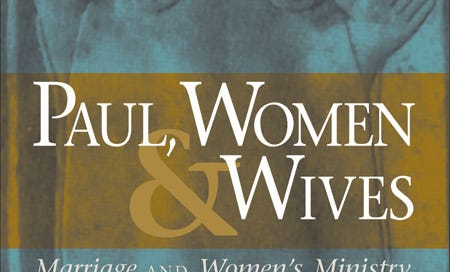Paul, Women & Wives: Introduction
An Ongoing Series About The Theological Foundation for Why I Believe Women Can Serve as Pastors, Elders and Leaders in the Church
In Paul, Women & Wives, Dr. Craig S. Keener presents a substantive, Scripture-based defense for egalitarian theology, principles and practices. Join me as we explore the writings of Paul in a way that liberates women, not subjugates them.
2 weeks ago, we tackled the preface of the book. Now, we’re diving into the Introduction. Honestly… these are two parts of books that I often skip, or at the very least skim, but Keener has packed so much into them that sets the foundation for his exegesis that they are necessary to understand the purpose of the book.
Introduction
“All biblical passages may be for all time, but all biblical passages are not for all circumstances.” - pg 59
This quote is tattoo-worthy. If you engage with the Christian Scripture for any of length of time, with any seriousness, this phrase should be a mantra you should repeat. This is especially true for pastors, elders, group leaders or anyone else who may be preaching and teaching the Jewish or Christian Scriptures. And it’s extremely pertinent to our discussion.
The most common accusation levied at egalitarians is that we have a “low view of Scripture” or are throwing out whole chunks of God’s Word to arrive at our conclusion that women can serve in the church in the same capacities as men and aren’t the only party called to submit in the home. For some, that is true. Part of their faith journey (especially those that are deconstructing or recovering from painful church experiences) is how they relate to the Bible. Especially if it was wielded like a weapon in their communities to harm them or control them. Sometimes, that experience leads folks to view Scripture with skepticism or completely disregard its authority in their life and belief system, while still clinging to faith in Jesus.
I have nothing but grace and compassion for my brothers and sisters who feel that way. However, that’s not my experience. In fact, it is in my authoritative view of Scripture that led to my egalitarian theology. And understanding this quote is big reason why, as Keener will lay out in further chapters.
Keener’s 2 Initial Problems with Egalitarianism
Questioning Women Who Felt Called to Ministry
How can we be sure anyone was called?
Once we start questioning calling, it can become deeply uncomfortable
Throw out all of the Bible?
Using cultural context felt like a slippery slope
If we throw out this verse because of context, what makes us keep other ones?
QUESTION: Did you experience any intellectual or emotional problems as you considered women in ministry? If so, what were they?
Biblical Interpretation or Feminist Agenda?
“The complication with placing this book in such a category (biblical feminism), of course, is that not everyone defines either “biblical” or “feminism” in the same way, so it would not contribute anything to the discussion to embrace the tide without defining what sort of issues this book addresses and what sorts of issues it does not address.”1
In previous generations and in other cultures, Scripture has been used to justify harmful practices like abuse and exploitation.
Equality for women is part of God’s design for humanity and Jesus’ vision for His movement.
QUESTION: The complementarian view doesn’t (necessarily) mean subordination for women. True or false?
The Nature of This Book
“I hope that my suggestions will in practice be equally useful for the nonoppressive traditionalist and the loving egalitarian: mutual submission means that we should look out for one another’s interests, and that is a difficult enough call in itself to demand our dependence on the Holy Spirit. Mutual submission does not reduce the wife’s responsibility articulated in the traditional position; it merely reminds the husband that he, too, must submit to his wife as a fellow-heir of the grace of life.”2
Keener, Craig S.. Paul, Women, and Wives: Marriage and Women's Ministry in the Letters of Paul (p. 60). Baker Publishing Group. Kindle Edition.
Keener, Craig S.. Paul, Women, and Wives: Marriage and Women's Ministry in the Letters of Paul (p. 69). Baker Publishing Group. Kindle Edition.




